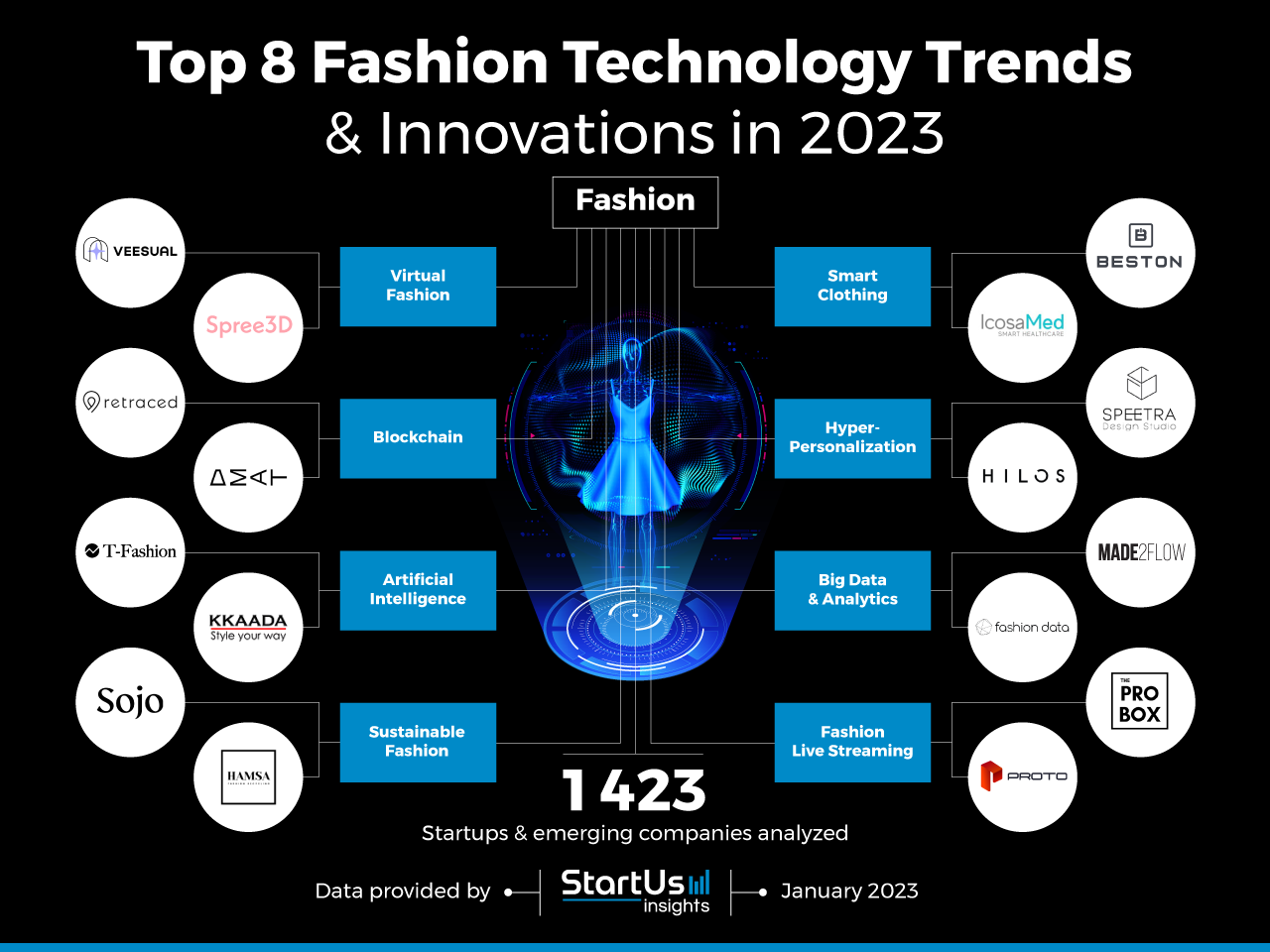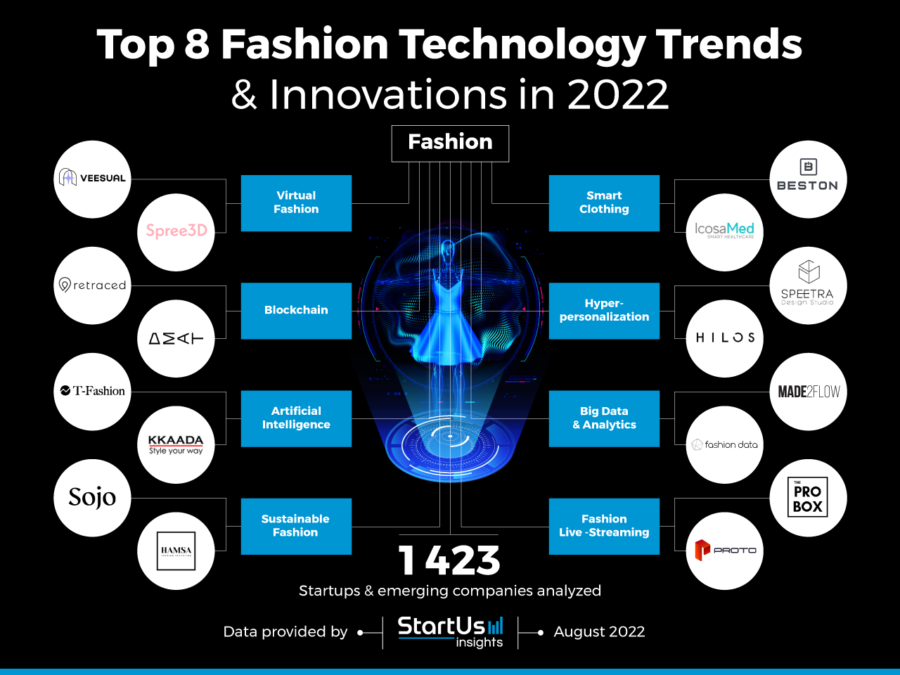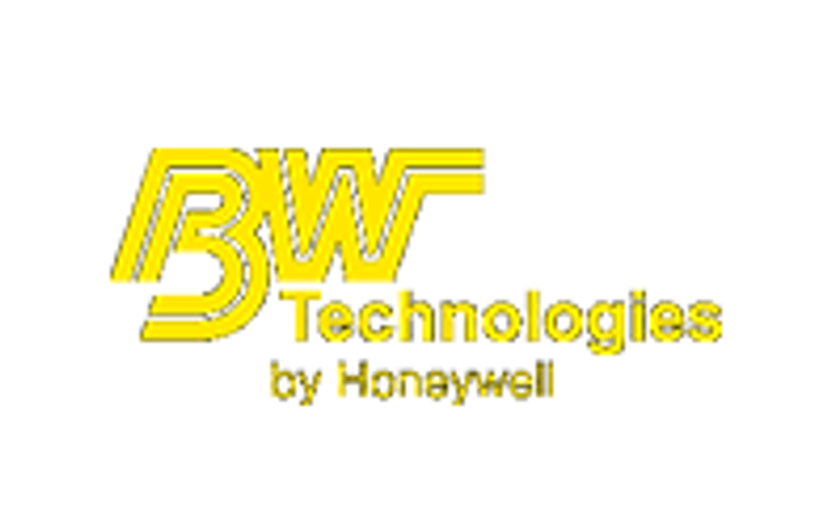Fashion Technology Companies: Shaping the Future of Style
Fashion technology companies are revolutionizing the way we design, create, and experience fashion. From artificial intelligence that predicts trends to virtual reality that lets us try on clothes digitally, these […]

Fashion technology companies are revolutionizing the way we design, create, and experience fashion. From artificial intelligence that predicts trends to virtual reality that lets us try on clothes digitally, these companies are blurring the lines between the physical and digital worlds.
This convergence of fashion and technology is driven by several factors, including the increasing demand for personalized experiences, the rise of e-commerce, and the need for sustainable practices. Emerging technologies like AI, AR, VR, and blockchain are playing a crucial role in shaping the future of the industry, empowering consumers, and transforming the traditional fashion value chain.
The Rise of Fashion Technology

The fashion industry is undergoing a digital transformation, fueled by the rapid adoption of technology. From design and production to marketing and retail, technology is revolutionizing every aspect of the fashion value chain. This integration is driven by several key factors, including the growing demand for personalized experiences, the need for greater efficiency and sustainability, and the emergence of innovative technologies that are reshaping the industry.
Impact of Emerging Technologies
Emerging technologies are playing a pivotal role in shaping the future of fashion. Artificial intelligence (AI), augmented reality (AR), virtual reality (VR), and blockchain are transforming the way fashion is designed, produced, and consumed.
- AI is being used to automate tasks, personalize customer experiences, and optimize supply chains. For example, AI-powered platforms can analyze vast amounts of data to identify fashion trends, predict demand, and optimize inventory management.
- AR is allowing consumers to visualize how clothing items would look on them before making a purchase. This technology is particularly useful for online retailers, as it helps to reduce returns and increase customer satisfaction.
- VR is creating immersive experiences that allow consumers to explore virtual fashion shows, try on clothes in virtual fitting rooms, and even design their own garments. VR technology is also being used by fashion brands to train employees and showcase new collections.
- Blockchain technology is enhancing transparency and traceability in the fashion supply chain. By tracking the origin of materials and the journey of products, blockchain can help to combat counterfeiting, ensure ethical sourcing, and promote sustainability.
Innovative Fashion Technology Companies
Several companies are at the forefront of the fashion technology revolution, disrupting traditional practices and shaping the future of the industry.
- Stitch Fix: This personalized styling service uses AI to curate clothing recommendations for its subscribers based on their preferences and style. Stitch Fix’s approach has revolutionized online shopping, providing a more personalized and convenient experience for customers.
- Farfetch: This online luxury marketplace leverages technology to connect buyers with luxury brands and boutiques worldwide. Farfetch’s platform offers a seamless and global shopping experience, making luxury fashion more accessible to consumers.
- Thread: This AI-powered personal stylist uses data and machine learning to suggest clothing items based on individual preferences and style. Thread’s approach provides a personalized shopping experience that is tailored to each customer’s unique needs.
- DressX: This company specializes in digital fashion, creating virtual clothing items that can be worn in the metaverse and other digital environments. DressX is pushing the boundaries of fashion by offering a new way to express personal style in the digital world.
Fashion Technology Applications
Fashion technology is revolutionizing the fashion industry by offering innovative solutions across the entire value chain, from design to customer experience. These applications are transforming how fashion is created, manufactured, and consumed, creating a more efficient, sustainable, and personalized experience.
Applications of Fashion Technology, Fashion technology companies
Fashion technology is transforming the fashion industry by offering innovative solutions across the entire value chain, from design to customer experience. These applications are transforming how fashion is created, manufactured, and consumed, creating a more efficient, sustainable, and personalized experience.
| Application | Technology | Benefits | Examples |
|---|---|---|---|
| Design | AI-powered design tools, 3D modeling software, virtual fashion platforms | Faster design iterations, reduced prototyping costs, enhanced creativity and innovation |
|
| Manufacturing | Smart factories, automated production lines, 3D printing, sustainable materials | Increased efficiency, reduced waste, improved quality control, faster production cycles |
|
| Retail | E-commerce platforms, personalized recommendations, virtual try-on technology, augmented reality (AR) and virtual reality (VR) experiences | Enhanced customer experience, improved product discovery, increased sales, reduced returns |
|
| Customer Experience | Social media integration, personalized styling services, interactive fashion apps, wearable technology | Increased engagement, improved brand loyalty, enhanced customer satisfaction, personalized shopping experiences |
|
Key Players in the Fashion Technology Landscape: Fashion Technology Companies
The fashion technology landscape is populated by a diverse range of companies, each contributing to the evolution of the industry in unique ways. These companies can be categorized based on their areas of expertise and target markets, offering a comprehensive view of the industry’s growth and innovation.
Leading Fashion Technology Companies
The following list highlights some of the leading fashion technology companies and their areas of expertise:
- Shopify: A leading e-commerce platform provider that empowers businesses of all sizes to build and manage their online stores. Shopify’s user-friendly interface and comprehensive suite of tools have made it a popular choice for fashion brands seeking to establish an online presence.
- Stitch Fix: A personalized styling service that leverages data and algorithms to curate and deliver personalized clothing selections to subscribers. Stitch Fix’s approach combines technology with human expertise, providing a unique and convenient shopping experience.
- Farfetch: A luxury e-commerce platform that connects consumers with a wide range of high-end fashion brands. Farfetch’s focus on luxury and its innovative technology have made it a leader in the online luxury fashion market.
- ASOS: A global online fashion retailer known for its wide selection of clothing, accessories, and beauty products. ASOS leverages technology to streamline its operations, provide personalized recommendations, and enhance the customer experience.
- ThredUp: A leading online platform for buying and selling secondhand clothing. ThredUp’s focus on sustainability and affordability has made it a popular choice for environmentally conscious consumers.
- Amazon Fashion: A dedicated platform within Amazon that offers a wide range of clothing, shoes, and accessories. Amazon’s extensive reach and technological capabilities have made it a major player in the online fashion market.
- Rent the Runway: A fashion rental service that allows subscribers to rent designer clothing and accessories for special occasions. Rent the Runway’s innovative business model has disrupted the traditional fashion industry by providing access to luxury items at a fraction of the cost.
- The RealReal: An online marketplace for authenticated luxury goods. The RealReal’s focus on authenticity and its use of technology to verify the legitimacy of items has made it a trusted source for luxury fashion.
- Net-a-Porter: A luxury online retailer known for its curated selection of designer fashion and its focus on providing a high-end customer experience. Net-a-Porter’s commitment to quality and its use of technology to enhance the shopping experience have made it a leader in the online luxury fashion market.
Approaches of Different Companies
The approaches of different fashion technology companies vary significantly in terms of their product offerings, business models, and impact on the industry. Some companies focus on providing tools and platforms for fashion brands, while others directly engage with consumers.
- Platform Providers: Companies like Shopify and Salesforce provide e-commerce platforms and tools that empower fashion brands to manage their online operations, engage with customers, and drive sales.
- Personalized Styling Services: Companies like Stitch Fix and Trunk Club leverage data and algorithms to curate personalized clothing selections for their subscribers, offering a convenient and personalized shopping experience.
- Direct-to-Consumer Brands: Companies like Warby Parker and Everlane have disrupted traditional retail models by selling their products directly to consumers online, eliminating the need for intermediaries.
- Sustainable Fashion Solutions: Companies like ThredUp and Patagonia are addressing the environmental impact of the fashion industry by promoting secondhand clothing and sustainable practices.
Key Partnerships and Collaborations
Partnerships and collaborations between fashion brands and technology companies are becoming increasingly common, as both sides recognize the benefits of combining their expertise.
- Technology Integration: Fashion brands are partnering with technology companies to integrate new technologies into their products and services, such as smart fabrics, wearable technology, and augmented reality experiences.
- Data-Driven Insights: Fashion brands are leveraging the data capabilities of technology companies to gain insights into consumer behavior, optimize their product offerings, and personalize their marketing efforts.
- E-commerce Solutions: Fashion brands are partnering with e-commerce platforms to expand their online presence, reach new markets, and improve their customer experience.
- Supply Chain Optimization: Fashion brands are collaborating with technology companies to optimize their supply chains, reduce waste, and improve efficiency.
The Future of Fashion Technology
The realm of fashion technology is poised for an exciting evolution, driven by advancements in artificial intelligence (AI), robotics, and sustainable materials. These innovations are set to reshape the industry, leading to personalized experiences, optimized production processes, and a more eco-conscious approach to fashion.
Emerging Trends and Future Directions
The convergence of fashion and technology is leading to a dynamic landscape, where innovation is driving significant changes in the industry.
- Artificial Intelligence (AI): AI is revolutionizing various aspects of fashion, from personalized styling recommendations and virtual try-ons to automated pattern design and fabric selection. AI-powered platforms analyze customer data to understand preferences and trends, enabling brands to create more targeted and personalized experiences. For example, companies like Stitch Fix and Style Theory leverage AI to curate personalized wardrobes for their customers.
- Robotics: Robotics is automating various tasks in the fashion industry, from pattern cutting and sewing to fabric handling and quality control. Robotic systems are improving efficiency, reducing labor costs, and ensuring consistent quality in production. Companies like Sewbo and SoftWear Automation are developing robotic systems that can create garments with high precision and speed.
- Sustainable Materials: Growing environmental concerns are driving the development of sustainable materials in fashion. Companies are exploring innovative materials derived from recycled plastic, plant-based sources, and bio-engineered fabrics. These materials offer eco-friendly alternatives to traditional textiles, minimizing the environmental impact of fashion production. For example, companies like Patagonia and Adidas are using recycled materials in their products, while brands like Stella McCartney are promoting vegan leather and other sustainable alternatives.
Impact on the Industry
The integration of fashion technology is expected to significantly impact the industry in the next 5-10 years.
- Personalized Shopping Experiences: AI-powered platforms will provide personalized styling recommendations, virtual try-on experiences, and customized garment designs, tailoring fashion to individual preferences and needs.
- Optimized Production Processes: Robotics and automation will streamline production processes, increasing efficiency, reducing waste, and ensuring consistent quality.
- Sustainable and Ethical Practices: The adoption of sustainable materials and eco-friendly manufacturing practices will minimize the environmental impact of fashion production, promoting a more responsible and ethical approach to the industry.
- New Business Models: Fashion technology will facilitate the emergence of new business models, such as on-demand manufacturing, subscription services, and personalized customization, offering greater flexibility and customization for consumers.
Challenges and Opportunities
As fashion technology evolves, companies face both challenges and opportunities.
- Investment and Adoption: The adoption of new technologies requires significant investment in research and development, infrastructure, and training. Companies need to navigate the costs and complexities of implementing these technologies.
- Data Privacy and Security: The use of AI and data analytics raises concerns about data privacy and security. Companies must ensure responsible data collection, storage, and use, adhering to ethical guidelines and regulatory frameworks.
- Job Displacement: The automation of tasks in fashion production may lead to job displacement in certain areas. Companies need to address the potential impact on workers and explore strategies for retraining and upskilling.
- Consumer Acceptance: Consumers need to be comfortable with the adoption of new technologies in fashion. Companies need to educate consumers about the benefits and address any concerns related to privacy, security, and ethical implications.
- Innovation and Differentiation: The rapid pace of innovation in fashion technology creates a competitive landscape. Companies need to continuously innovate and differentiate themselves to remain relevant and attract customers.
Final Conclusion
As fashion technology continues to evolve, we can expect to see even more innovative solutions that address the challenges and opportunities facing the industry. From personalized shopping experiences to sustainable manufacturing processes, these companies are pushing the boundaries of what’s possible in the world of fashion.
Fashion technology companies are constantly innovating, finding new ways to integrate technology into the world of clothing and accessories. This drive for innovation can be seen in other industries as well, like the world of pool technologies , where companies are developing smart pool systems that can be controlled remotely and optimize energy efficiency.
Just as fashion technology companies are revolutionizing how we dress, pool technology companies are changing how we enjoy our pools.





